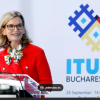By 2030, artificial intelligence could replace the equivalent of 300 million full-time jobs around the world. But a new study by the digital entertainment platform JB suggests that in some countries, machines may never match the power of human creativity, culture, and diplomacy.
The research, which identifies nations where AI automation is least likely to replace human soft power, examines a range of social, cultural, and economic indicators. Among them: the Human Development Index (which measures life expectancy, education, and income levels), the Global Talent Competitiveness Index (which assesses a nation’s ability to attract and retain skilled workers), the Innovation Index, the Global Soft Power Index, and even the number of Nobel and Oscar winners each country has produced.
Combined, these factors form what JB calls the Human Soft Power Score—a measure of how well human ingenuity, values, and influence can endure in an era of relentless automation.
The findings are telling.
At the top of the list is the United States, which the report says is best positioned to retain its human-driven influence despite advances in AI. America holds the highest Global Soft Power Index of 79, reflecting its strong diplomatic ties and trade relationships. Its 428 Nobel Prizes—more than triple that of any other nation—underscore its historic dominance in science and research.
Switzerland ranks second, with a Soft Power Reliance Score of 83, driven by its global leadership in innovation and research. The study notes that the country’s 20,000 scientists and a high Talent Competitiveness Score of 79 make it one of the world’s most attractive destinations for skilled professionals.
In third place, the United Kingdom combines tradition and innovation. With 98,000 researchers and 143 Nobel laureates—second only to the U.S.—Britain’s scientific foundation remains formidable. It also holds the second-highest Global Soft Power Index, at 72, reflecting its deep cultural and diplomatic reach.
Germany follows in fourth, with its scientists earning 115 Nobel Prizes—the third-most globally—and a Human Development Index of 0.96. The study credits Germany’s strong education system and resilient job market for helping its citizens adapt to AI-driven change. Its Global Soft Power Index of 70 further cements its international influence.
France, in fifth place, scores 74 on the Human Soft Power scale. Beyond its scientific prowess, the country’s cultural footprint remains unmatched: France boasts 12 Oscar winners—more than any other nation—and a Soft Power Index of 67, emphasizing its continuing sway on Europe’s political and artistic landscape.
Sweden ranks sixth, also with a Human Development Index of 0.96. Known for its egalitarian education and technological prowess, Sweden ranks second in global innovation, behind only Switzerland.
Denmark, in seventh place, stands out for its ability to attract global talent. It holds the second-highest Talent Competitiveness Index score, at 77, supported by a dynamic job market and high wages. Its four Oscar wins equal Germany’s tally, reflecting a thriving film industry.
In eighth place, Japan combines intellectual strength with cultural diplomacy. With an average IQ of 106—among the highest worldwide—and 41,000 researchers, Japan has earned 31 Nobel Prizes. Its Global Soft Power Index of 71 ranks third globally, reflecting its steady diplomatic engagement and cultural influence.
Canada takes ninth, with a Soft Power Score of 67. Its Talent Competitiveness Index of 70 reflects a robust labor market and competitive salaries. The country’s 61,000 active researchers and a Human Development Index of 0.94 underline its commitment to lifelong learning and workforce adaptability.
Rounding out the top ten is the Netherlands, with a score of 66. The Dutch population’s average IQ of 100 and an exceptional Human Development Index of 0.96 make it one of the world’s most educated societies—a foundation for maintaining human relevance in an AI-dominated future.
In a statement accompanying the findings, a JB spokesperson said: “AI can enhance efficiency, but it cannot replace what makes nations truly influential: their culture, creativity, and human insight. Countries that invest in education, leadership, and the arts preserve their uniqueness and turn human potential into lasting global impact. In a world increasingly shaped by technology, it is this blend of talent, values, and innovation that ensures enduring influence and meaningful progress.”
The study ultimately suggests that while automation may reshape labor markets, it is human imagination—expressed through art, diplomacy, and discovery—that will continue to define global leadership.




